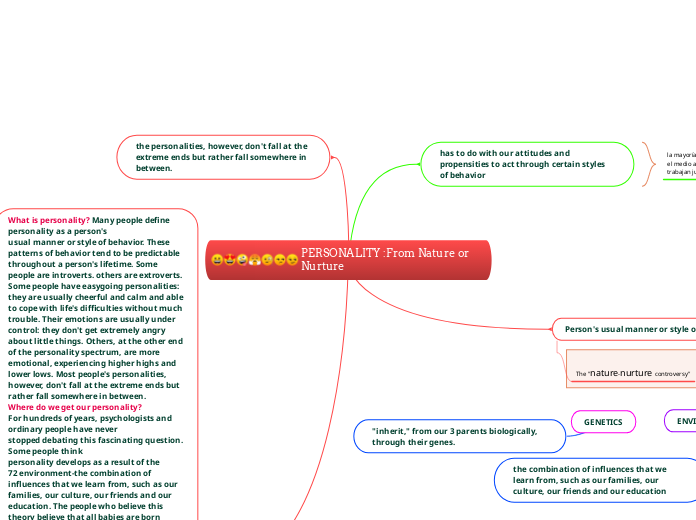PERSONALITY :From Nature or Nurture
has to do with our attitudes and propensities to act through certain styles of behavior
Person's usual manner or style of behavio
The "nature-nurture controversy"
the personalities, however, don't fall at the extreme ends but rather fall somewhere in between.
What is personality? Many people define personality as a person's
usual manner or style of behavior. These patterns of behavior tend to be predictable throughout a person's lifetime. Some people are introverts. others are extroverts. Some people have easygoing personalities: they are usually cheerful and calm and able to cope with life's difficulties without much trouble. Their emotions are usually under control: they don't get extremely angry about little things. Others, at the other end of the personality spectrum, are more emotional, experiencing higher highs and lower lows. Most people's personalities, however, don't fall at the extreme ends but rather fall somewhere in between.
Where do we get our personality?
For hundreds of years, psychologists and ordinary people have never
stopped debating this fascinating question. Some people think
personality develops as a result of the
72 environment-the combination of
influences that we learn from, such as our families, our culture, our friends and our education. The people who believe this theory believe that all babies are born without a personality and that it's the environment that determines, or forms, each child's personality. This school of thought is called the "nurture school."
At the other end of the continuum
we find people who believe that personality is determined by "nature," or the characteristics we receive, or "inherit," from our 3 parents biologically, through their genes. These people believe that our personality is not determined by the environment, but rather by genetics, and that each baby is born with a personality.
The "nature-nurture controversy"
The nature-nurture controversy is very old. Experimental psychologists have tried to discover which of
these two factors, genetics or the environment, is more important in forming our personality. However, it's very difficult, if not impossible, to conduct research on real people with real lives. There's just no way to put people in a laboratory and watch them develop. For this rese there's no scientific way to settle the nature-nurture controversy Recent however, most researchers have come to believe that both the environme AND the genes-nurture and nature-work together and are bod
important Even though the experts have
largely discarded the idea that personality development is so black and white, the nature-nurture controversy remains a popular discussion among friends. It seems that everyone has an opinion
WHERE
NATURE-NURTURE
CONTROVERSY
la mayoría de los investigadores han llegado a creer que tanto el medio ambiente como los genes (la crianza y la naturaleza) trabajan juntos y están unidos.
